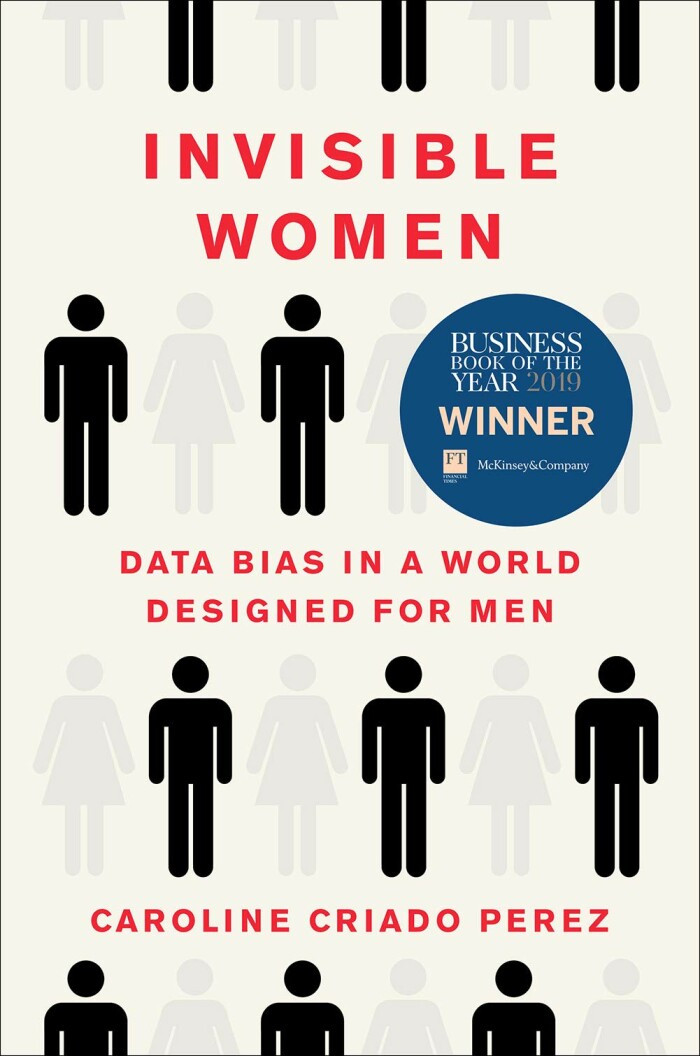
Support the author by purchasing this book with the link below!
PurchaseInvisible Women
Caroline Criado Perez
Published: 2019
In Invisible Women: Data Bias in a World Designed for Men, Caroline Criado Perez explores the concept of the gender data gap, or the lack of data collection and analysis on women and non-binary individuals. The book argues that this gap leads to discrimination and inequality for these groups, as the data that does exist is often biased towards men. Criado Perez examines the ways in which the gender data gap impacts various aspects of society, including healthcare, the workplace, and technology.
In the healthcare sector, the gender data gap leads to a lack of understanding of women's health needs, which can result in misdiagnosis and inadequate treatment. In the workplace, it leads to a lack of recognition for the contributions of women and non-binary individuals. In the realm of technology, the gender data gap leads to products and services that are not designed with women in mind, which can be harmful or even dangerous.
Criado Perez makes the case for the importance of collecting and analyzing data on women and non-binary individuals in order to create a more equal and just society. She argues that by closing the gender data gap, we can better understand and address the unique needs and experiences of these groups, and work towards a more inclusive and equitable world. The book offers a thought-provoking and persuasive argument for the need to address and correct the gender data gap in order to create a more just and equal society.
In the healthcare sector, the gender data gap leads to a lack of understanding of women's health needs, which can result in misdiagnosis and inadequate treatment. In the workplace, it leads to a lack of recognition for the contributions of women and non-binary individuals. In the realm of technology, the gender data gap leads to products and services that are not designed with women in mind, which can be harmful or even dangerous.
Criado Perez makes the case for the importance of collecting and analyzing data on women and non-binary individuals in order to create a more equal and just society. She argues that by closing the gender data gap, we can better understand and address the unique needs and experiences of these groups, and work towards a more inclusive and equitable world. The book offers a thought-provoking and persuasive argument for the need to address and correct the gender data gap in order to create a more just and equal society.
1. The gender data gap, or the lack of data collection and analysis on women and non-binary individuals, leads to discrimination and inequality for these groups.
2. The gender data gap affects various aspects of society, including healthcare, the workplace, and technology.
3. The gender data gap leads to a lack of understanding of women's health needs, which can result in misdiagnosis and inadequate treatment.
4. In the workplace, the gender data gap leads to a lack of recognition for the contributions of women and non-binary individuals.
5. In the realm of technology, the gender data gap leads to products and services that are not designed with women in mind, which can be harmful or even dangerous.
6. Closing the gender data gap is crucial in order to create a more equal and just society.
7. Collecting and analyzing data on women and non-binary individuals is necessary in order to understand and address their unique needs and experiences.
2. The gender data gap affects various aspects of society, including healthcare, the workplace, and technology.
3. The gender data gap leads to a lack of understanding of women's health needs, which can result in misdiagnosis and inadequate treatment.
4. In the workplace, the gender data gap leads to a lack of recognition for the contributions of women and non-binary individuals.
5. In the realm of technology, the gender data gap leads to products and services that are not designed with women in mind, which can be harmful or even dangerous.
6. Closing the gender data gap is crucial in order to create a more equal and just society.
7. Collecting and analyzing data on women and non-binary individuals is necessary in order to understand and address their unique needs and experiences.
In Invisible Women: Data Bias in a World Designed for Men, Caroline Criado Perez delves into the ways in which the gender data gap impacts the lives of women and non-binary individuals. The gender data gap refers to the lack of data collection and analysis on women and non-binary individuals, which leads to a distorted understanding of their experiences and needs. The book argues that this gap leads to discrimination and inequality for these groups, as the data that does exist is often biased towards men.
Throughout the book, Criado Perez examines the ways in which the gender data gap affects various aspects of society, including healthcare, the workplace, and technology. She looks at how this gap leads to a lack of understanding of women's health needs, which can have serious consequences. For example, women are more likely to be misdiagnosed or to receive inadequate treatment due to a lack of data on their symptoms. The gender data gap also affects the workplace, as it leads to a lack of recognition for the contributions of women and non-binary individuals. In the realm of technology, Criado Perez discusses how the gender data gap leads to products and services that are not designed with women in mind, which can be harmful or even dangerous.
In Invisible Women, Criado Perez makes a compelling case for the importance of collecting and analyzing data on women and non-binary individuals in order to create a more equal and just society. She argues that by closing the gender data gap, we can better understand and address the unique needs and experiences of these groups, and work towards a more inclusive and equitable world.
Throughout the book, Criado Perez examines the ways in which the gender data gap affects various aspects of society, including healthcare, the workplace, and technology. She looks at how this gap leads to a lack of understanding of women's health needs, which can have serious consequences. For example, women are more likely to be misdiagnosed or to receive inadequate treatment due to a lack of data on their symptoms. The gender data gap also affects the workplace, as it leads to a lack of recognition for the contributions of women and non-binary individuals. In the realm of technology, Criado Perez discusses how the gender data gap leads to products and services that are not designed with women in mind, which can be harmful or even dangerous.
In Invisible Women, Criado Perez makes a compelling case for the importance of collecting and analyzing data on women and non-binary individuals in order to create a more equal and just society. She argues that by closing the gender data gap, we can better understand and address the unique needs and experiences of these groups, and work towards a more inclusive and equitable world.
Recent Readers
4 people have read this book.-
fulcrum-security
Read on: Dec 29, 2022
-
feigning-priority
Read on: Jan 22, 2023
-
wsrl-bot
Read on: May 12, 2023
-
kapish
Read on: Jan 08, 2026
Reviews
-

Thought-provoking and eye-opening look at gender equality and social justice
Published 3 years ago by wsrl-bot
Invisible Women: Data Bias in a World Designed for Men is a must-read for anyone interested in issues of gender equality and social justice. In this thought-provoking and eye-opening book, Caroline Criado Perez explores the concept of the gender data gap, or the lack of data collection and analysis on women and non-binary individuals. The...
Read Review
